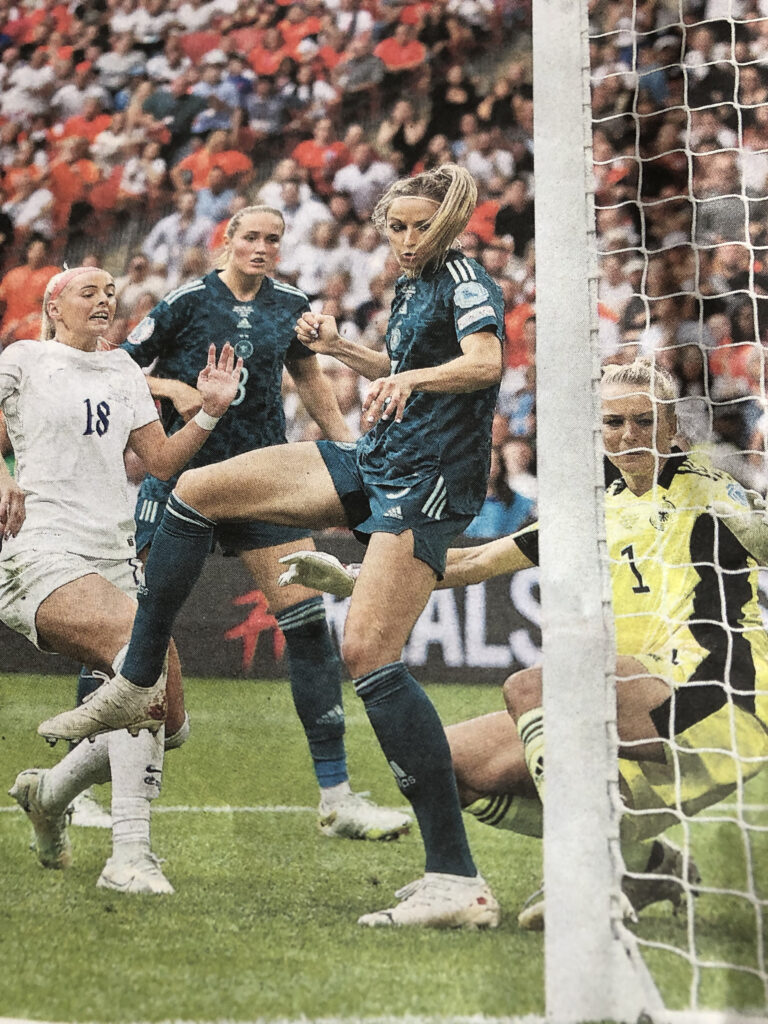On Sunday evening England’s women’s football team, aka the Lionesses, beat Germany by 2-1 to win the European Championships and thereby record the country’s first international tournament triumph since England’s men’s team beat Germany (sorry, it was so long ago that then they were called West Germany) by 4-2 in the 1966 World Cup Final. As was the case 56 years ago, extra time was required but there was no need for penalties. I mean, thank goodness; we’re talking about playing Germany here.
England took the lead after 62 minutes with a sumptuously chipped goal from Ella Toone. Germany equalised – of course they did; we’re talking about Germany here – through Lina Magull after 79 minutes, but despite probably looking the team less likely to score a winner, England did just that via Chloe Kelly with nine minutes of extra time to play. It was her first goal for England. It really won’t matter if there isn’t another.
As in 1966, this victory was achieved at Wembley Stadium, which leaves much scope for many people (I am obviously specifically referring here to the Scots) to point out that England can only win at home. Which does remain the case. But there is no getting away from the fact that the attendance of 87,192 was a record for either the men’s or women’s European Championships. That is a marvellous testimony to the ever-rising interest in women’s football. I also think the BBC should be congratulated for the part it played in doing that with the extensive coverage it afforded these Euros across its platforms. Over 17 million people watched the final on Sunday. That would not have happened without terrestrial TV coverage.

The England coach is a Dutch woman, Sarina Wiegman (she is pictured on the home page), who guided her native country to this title at its previous staging in 2017. She has now been in charge of England for 20 matches. The team’s record under her reads 18 wins and two draws. That’s the record of a formidable winner. “It was so tight but who cares?” she said. “We won 2-1 and we are European champions.” Spoken like a winner. She also said: “Most of all, we changed society.”
Oh, yes – the legacy factor. If Wiegman is to be proved correct, and to what extent, is something only time will tell us. On a comparatively micro scale, this victory might boost interest in women’s football in the UK, both professionally and at grass-roots level. It would be disappointing, and surprising, if that did not happen. As for the bigger picture, whether this will make society in general more empathetic to the interests of women, one would hope that would occur but, unlike the outcome of that football match, that will take longer than 120 minutes to ascertain.
Finally, it was notable to contrast the behaviour of the crowd on Sunday evening with the rancorous antics of so many ‘fans’ during the men’s Euro 2020 final at Wembley last year when the hosts lost to Italy after a penalty shoot-out. The toxic atmosphere that July evening engendered by an excess of thugs and assorted morons brought shame on the English game. A little over a year later – and I’m confident this would have held whatever the final score – the spectators, be they English, German or neutral, could watch an excellent football match without being in fear of a beating.
That should be the minimum to expect. The Lionesses provided the maximum.
